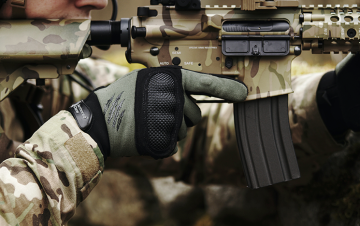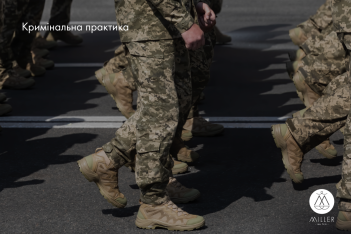Lawyer on issues of voluntary abandonment of the part (AWOL)
Voluntary abandonment of a military unit, as in any other legal context, involves the complexity and importance of various legal issues. One of the aspects that may arise is the voluntary abandonment of a unit (AWOL) in a military matter. This issue requires specialized legal expertise and a thorough understanding of military law. In the context of military affairs, what is AWOL can arise in different situations. For example, a soldier may decide to voluntarily leave his military unit without leave or duty clearance. This can have serious consequences for the service member, including disciplinary action and criminal liability.
Military legislation has its own rules and procedures regarding the voluntary abandonment of a unit. They may differ from civilian law and have specific rules and procedures that govern the conduct of military personnel. The Military Code of Ukraine provides for articles related to violations of military discipline that can be applied in such cases. The Law on the Armed Forces in Wartime, Article 25 "Military Discipline Violations", which defines violations and responsibility for them, as well as articles that provide for disciplinary measures.
Notification of voluntary abandonment of a military unit (AWOL) can be made in various ways, depending on the specific conditions and rules established by the country's military legislation.
Here are some general steps that can be taken to report a AWOL:
Contacting military authorities: A person with information about a AWOL may contact military authorities, including a military unit command, a military prosecutor, or the military police.
- Submitting a written statement: A person can make a written statement in which he describes in detail the facts of voluntarily leaving the military unit and provides all the necessary information.
- Use of special communication channels: In some cases, there are special communication channels for reporting violations of military discipline or immediate reporting of cases of AWOL.
- Confidential Hotline: Some military organizations may have a confidential hotline, through which information about cases of AWOL can be reported anonymously.
- Contacting law enforcement authorities: In case of serious circumstances or if the abandonment is related to criminal activity, the person may contact law enforcement authorities to report and investigate the incident.
If we are talking about arbitrarily leaving a military unit by mobilized personnel, this also constitutes a serious violation of the military disciplinary code or military legislation. Mobilized servicemen are obliged to observe military rules and regulations, as well as to perform military duties in accordance with the legislation of the country in which they are called to serve.
If a military unit has been voluntarily abandoned in a military unit, the search for individuals who have voluntarily abandoned a military unit (AWOL) is a complex process that is carried out by law enforcement agencies within the framework of military law and the current legislation of each country. It is worth knowing that military structures have special security and counter-intelligence services, which can be engaged in uncovering and searching for persons who have committed voluntary desertion of a military unit. In some cases, especially if the abandoned person is outside military installations, the search can be initiated by civilian law enforcement agencies. The search for the AWOL may involve the use of modern technologies, including databases and monitoring of social networks, which may help in identifying the whereabouts of individuals.
If you are a contract worker, the voluntary leaving of a military unit by a contractor of military service in Ukraine is regulated in accordance with military legislation and disciplinary norms.
Contract workers who voluntarily leave a military unit violate their military duties and are subject to disciplinary and criminal liability in accordance with the military legislation of Ukraine.
The reaction to voluntary desertion of a military unit can vary, including disciplinary sanctions, dismissal from service, as well as criminal liability in cases where the violation constitutes a crime under the Criminal Code of Ukraine. It is important to keep in mind that military cases require a specific approach to legal protection.
A wartime AWOL in a military case can have serious consequences for a serviceman and requires a careful legal approach. The professional assistance of a military law attorney can be critical in protecting the rights and interests of a serviceman in these difficult situations. If you or your loved one is faced with issues of AWOL in a military matter, you should seek qualified legal assistance.
Legal assistance from a lawyer on AWOL
The procedure for providing legal assistance may vary depending on the specific situation and needs of the client, but the main steps may be as follows:
- Contact a legal consultant or lawyer. First, the client contacts a professional legal consultant or lawyer to clarify the situation and determine whether legal assistance is needed, finds out what may be in a specific situation.
- Analysis of the situation. A lawyer or a lawyer conducts a consultation with the client to understand all the circumstances and details of the case of arbitrary abandonment of a part of the military. Legal aspects of the situation are analyzed and possible courses of action are determined. In the case of arbitrarily leaving a military unit by a mobilized serviceman, various types of disciplinary sanctions may be applied, which are provided for by the relevant military legislation. This may include fines, restrictions of freedom, arrests, as well as other measures provided for by the rules of discipline and the order of military service.
- Definition of strategy. Based on the consultation and analysis of the situation, a strategy for solving the problem or protecting the client's interests is developed. Alignment of the goal: Determination of specific goals of administrative liability, such as reduction of charges, avoidance of criminal responsibility, preservation of military career. In the case of voluntary desertion, the development of a strategy depends on the specific circumstances, the legal status of the person who committed the desertion, and the purpose of protection. Here are some possible strategies that can be used in this problem. The lawyer can facilitate the voluntary return of the client to the military unit or the visit of law enforcement agencies to resolve the situation. The lawyer may request an additional investigation into the circumstances that led to the voluntary abandonment in order to identify possible factors that influenced the client's behavior. in case of violation of rights or illegal actions by the military authorities or in case of compliance with the law, the lawyer can defend the client's interests in court, where is trying to soften the responsibility for the voluntary abandonment of the military unit. In some cases, it may be useful to negotiate with military officials to reach a favorable resolution of the situation without court intervention. Collection of evidence and testimony that can help clarify the circumstances and show reasoning behind the arbitrary abandonment. If a decision or sentence has already been passed, the lawyer can appeal the court's decision and try to get it reviewed.
- Preparation of documents and evidence. A legal consultant or lawyer helps the client in preparing all the necessary documents and evidence to resolve the case of voluntary abandonment of a military unit during wartime. The lawyer must collect all available information regarding the circumstances of the case. This includes the collection of evidence, information about the events preceding the voluntary abandonment, as well as any other relevant data. He must carefully analyze all the collected evidence, determine its strength and the likelihood that it will help the case.
- Representation in authorities or court In cases of need, a lawyer or an advocate can represent the client's interests before authorities or in court. In Ukraine, the legal provision regarding voluntary desertion of a military unit (AWOL) is regulated by the Criminal Code of Ukraine and other normative acts related to military discipline and order. The Law on AWOL establishes responsibility for the voluntary abandonment of a military unit. According to this article, a person who voluntarily left a military unit or a place of service is punished by a fine or restriction of freedom for a period of up to two years. They protect the client's rights and interests and provide all the necessary legal support during the procedures.
- Monitoring and updating. After the start of the process of solving the case of voluntary leaving the military unit or the place of service, the lawyer or lawyer provides constant monitoring and updating the client regarding the further development of the situation and possible actions.
- Final actions. After the case is closed or the problem is resolved, the legal advisor or attorney can provide the client with recommendations on how to proceed and prevent similar situations in the future. A serviceman who is released from military service must complete all necessary administrative procedures and paperwork related to his release. Responsibility for military service includes returning all military items, weapons, special equipment and other property issued to him during his service. Depending on the conditions of release, a final medical examination and the issuance of medical documents confirming the state of health of the serviceman during his service may be conducted. Military personnel who are released from military service may need help or advice on adapting to civilian life, finding a job, and getting an education.
Proper legal support can help reduce liability and mitigate sanctions, as well as provide legal protection against illegal actions.
Under what conditions can the services of a lawyer on AWOL be provided?
The legal aid service can be provided in a variety of settings, which usually include:
- Existence of legal questions or problems: Legal aid can be provided in situations where a person has questions or problems related to the legal field, such as civil law, criminal law, family law, etc., in this situation it concerns the AWOL punishment.
- Legality and reasonableness of the case: Legal assistance can be provided only in those cases when the case or issue has a legal and reasonable basis.
- Availability of means to pay: Legal aid is often a fee-based service, so it is important to have a sufficient level of financial means to pay for the services of a lawyer or lawyer.
- Cooperation and mutual understanding: In order to effectively provide legal assistance, it is necessary to cooperate with the client and have mutual understanding regarding the goals and expectations of the case of voluntary desertion during martial law.
- Ensuring confidentiality and ethical standards: Services must be provided in accordance with ethical standards and ensure the confidentiality of client information.
Only under these conditions can one expect an effective resolution of the case and protection of the client's interests.
When can the services of a lawyer on AWOL not be provided?
There are also circumstances in which the provision of the service is impossible:
- Conflict of interest: If the lawyer or lawyer is in a situation of conflict of interest with the client.
- Illegal or morally objectionable purposes: If the client requests legal assistance for purposes that are contrary to law or ethical standards.
- Lack of specialization: If the lawyer or lawyer does not have the necessary specialization or experience in a specific field.
- Conflict with the law: If the client's case or actions contradict the law or violate the rights of other persons.
- Financial restrictions: If the client does not have sufficient financial resources to pay for the services of a lawyer.
- Ineffective cooperation: If cooperation with the client turns out to be ineffective due to non-transparency, false information or unwillingness to cooperate with the lawyer.
It is important that legal assistance be provided only within the framework of the law and ethical norms, which ensures legality and legal protection of all parties.
Frequently asked questions about AWOL
Question
Can the absence of a good reason for not showing up for duty lead to criminal liability?
Answer
Thus, in many countries, the absence of a valid reason for not reporting for service in the army or a military unit can lead to criminal liability. This may be considered a violation of military law or military code, which may have serious consequences. Article 407 of the Criminal Code of Ukraine, failure to report for military service without valid reasons in conditions of martial law or in a combat situation may lead to criminal liability. The specified article provides for punishment for AWOL, criminal liability for evasion of military duty in conditions of martial law. Various types of penalties may be applied for this violation according to the Criminal Code of Ukraine, including arrest, imprisonment or others.
Question
Is there a possibility of appeal in the event that responsibility for desertion in wartime was imposed, disciplinary sanctions for voluntarily leaving the unit?
Answer
In Ukraine, as in many other countries, persons who have been subject to disciplinary sanctions for voluntarily leaving a unit during wartime have the right to appeal. The appeal procedure allows you to challenge the decision made at the previous stage before higher military or judicial authorities. The algorithm of actions in case of AWOL provides for the submission of an appropriate application to the appeal body or court, which indicates the reason for the appeal and the arguments supporting the appeal. After that, an appellate review of the case is conducted taking into account the submitted arguments and in accordance with the established procedure.
Question
Which article is responsible for committing crimes against humanity in Ukraine?
Answer
In Ukraine, voluntary abandonment of a military unit (AWOL) is subject to criminal liability, Article 407, voluntary abandonment of a military unit or place of service is governed by this. In accordance with this article, the voluntary leaving of a military unit, place of service or location without valid reasons, which caused a violation of official duties, is punishable by imprisonment for a term of up to two years. This article provides for responsibility for arbitrarily leaving a military unit with a weapon, which is a serious violation of military discipline and can have serious consequences for a serviceman.
What does the cost of the services of a lawyer on AWOL depend on?

The presence of unforeseen factors.

The amount of evidence.

The level of conflict.
ConclusionA lawyer specializing in cases of desertion from a military unit (AWOL) plays a key role in protecting the rights of servicemen. He not only helps to understand complex legal issues related to military law, but also develops a defense strategy, collects the necessary evidence and represents the client's interests in court or before the authorities. Timely legal assistance can significantly reduce the negative consequences for a serviceman, as well as contribute to the mitigation of punishment.








































